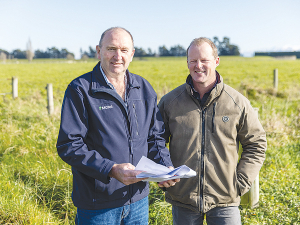Big native planting effort creates resource-rich ecosystem
Over the last three years, 4500 native plants have been planted along a 2.5 kilometre stretch of the Burgess Stream.
 Integrated Farm Plan (IFP) lead consultant Paul Reese discusses IFP outcomes with Swannanoa farmer Andrew Gilchrist.
Integrated Farm Plan (IFP) lead consultant Paul Reese discusses IFP outcomes with Swannanoa farmer Andrew Gilchrist.
Swannanoa farmer Andrew Gilchrist has delved deep into the business and people side of his family-operated farm through completing an Integrated Farm Plan (IFP).
Gilchrist is one of 15 Waimakariri farmers to develop an IFP as part of Next Generation Farming, a two-year innovation project led by Waimakariri Landcare Trust (WLT).
The main aim of the Next Generation Farming project is to help farmers explore and adopt ways of farming that are as profitable as possible within environmental limits.
The project is supported by the Ministry for Primary Industries through its Sustainable Food and Fibre Futures fund, Waimakariri Irrigation Limited (WIL), Environment Canterbury, Ballance Agri-Nutrients, and DairyNZ.
IFP project lead Paul Reese described the plan as the “next step up from a Farm Environment Plan”. It examines five areas of a farm operation including business, people, farm systems, the environment and animals and crops.
“Like an FEP, the IFP looks at the environment, but it takes a much broader view of the entire farm business and delves deeper into a broader range of key topics.
“During our interview with the farmer we go through a set of questions and then identify where the gaps are so we can find the appropriate expert to work with the farmer on these areas.
“In Andrew’s case, we identified business and people as focus areas.”
Gilchrist says while the process was a bit nerve-wracking to begin with, receiving the plan and being able to access expert assistance has helped him and his brother to make progress on the business and people side of their farm operation.
The pair have 430ha of family owned and leased land which they use for dairy support, mixed cropping, and lamb finishing. They employ 15 staff and operate a successful crop spraying business.
“We have grown very quickly over the last seven years from our original crop spraying business to owning and leasing farms, so everything has moved really fast.
“Doing the IFP has cemented our thoughts on governance being a key focus area for us and it has given us the push to get on with it and to establish a clearer structure around roles and responsibilities.
“We were able to look at who is responsible for each area of the farm business and make sure that we are clear on what that looks like.”
Reese says while every farm has different areas to work on after completing the plan, there are several common themes that have emerged.
“We have noticed that there are some gaps in the business and people areas. I think because farmers are practical people and are more focused on working in the business, it can be harder to find the time to work on the business.
“The IFP allows you to take a step back from your daily tasks and take a helicopter view to see if there are any gaps that need to be filled in. You get a clear picture of where the opportunities are to grow your farming operation.”
All the farmers who participated in the project have provided positive feedback on the IFP process and Paul says the IFP template is now being used by a wider group of farmers.
“It’s been really well received, and I think it will continue to be used more widely to provide a deeper overview of how a farm business is operating and then giving farmers the support and help they need to make improvements.”
Gilchrist recommends that farmers give the IFP a go and says that while there are some searching conversations to be had, the overall outcome is extremely positive.
“Just take the ball and run with it. There will be nothing but good that comes out of it.”
Former Fonterra executive Alex Turnbull has been appointed CEO to lead all five Yili Oceania Business Division companies in New Zealand.
Fonterra executive René Dedoncker is leaving the co-operative later this year to lead Australian agribusiness Elders.
Alliance Group and the Southland Stags rugby team have joined forces in a partnership that will see the the meat co-operative's farmgate brand feature on players' team kits and replica jerseys.
Fonterra's plan to expand its organic programme to the South Island is being well received by farmers, the co-op says.
Voting has started for the renewal of DairyNZ's milksolids levy.
The most successful catchment groups in NZ are those that have 'a source to sea' approach.
OPINION: A dairy version of fantasy football has been launched.
OPINION: In recent weeks beaches in Auckland, Wellington and Christchurch have been unsafe to swim in because of recent heavy…